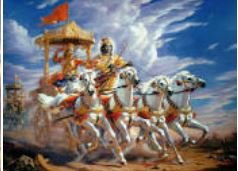You are ‘Atma’ (Immortal) so Get Killed: That was never the message of Bhagvad Gita!


I have often heard that our Gurus who chose death over conversion to Islam knew that they are Atma (Soul) that is immortal, as described in Bhagvad Gita. So, Aurangzeb and his ilk could kill their body but not Atma, and therefore offered themselves for death rather than converting to Islam. We must bow our heads to them and are deeply indebted to them for their sacrifices. Indeed, their sacrifices are the torch- bearer and constant reminders to the future generations what happened, why and when, and what lessons must be learned.
When I read Bhagvad Gita, I do see that Atma is described as the real self of an individual and immortal. But what was the context and goal, then? Why did Krishna describe and introduce Arjuna to ‘Atma’? That was to inspire him to do his duty, even if it involved killing his kinsmen.
Krishna never taught Arjuna that offer yourself for death at the hands of Kaurvas because you are Atma.
The prime message of Bhagvad Gita, as I got, is that your duty is supreme. You must do everything required in the line of duty. If you don’t do your duty, you lose your power, position, name and fame; that is worse than the death in the line of duty. (Bhagvad Gita, Chapter 2, Shloka 2- 38).
For the protection of the virtuous, for the extermination of evil- doers and for establishing righteousness in the society, you must fight and kill if situation demanded. (Bhagvad Gita, Chapter 4, Shloka 8).
Of course, it should not be confused with senseless killing. It is when all other options of peace and coexistence have been exhausted.
Elsewhere in Mahabharta (of which Bhagvad Gita is a part) it has been so well said:
Ahimsa Parmo Dharma, Dharm himsa tathaive Che.
Meaning: Non- violence is supreme Dharma (duty), but himsa (violence) in the service of Dharma (duty) is supreme too.
DISCLAIMER: The author is solely responsible for the views expressed in this article. The author carries the responsibility for citing and/or licensing of images utilized within the text.
